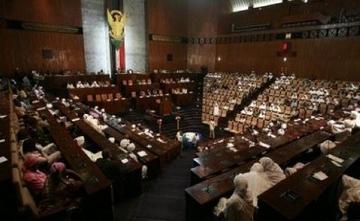Sudan parliament ratifies cooperation agreement with South Sudan despite objections
October 17, 2012 (KHARTOUM) – The Sudanese parliament approved on Wednesday the cooperation agreement and accompanying deals signed with South Sudan last month despite objections raised by some members over the aspect of four freedoms.
 The agreement was signed in the Ethiopian capital Addis Ababa on 27 September following marathon talks between Sudan President Omer Al-Bashir and his South Sudanese counterpart Salva Kiir Mayardit. It was signed along with other seven deals covering resumption of South Sudan oil exports via Sudan, security arrangements by establishing a demilitarized buffer zone along the common borders, banking, post-service benefits, trade and economic matters, border demarcation and the four freedoms which grant citizens of each country the freedom of movement, ownership, work and residence in the other country.
The agreement was signed in the Ethiopian capital Addis Ababa on 27 September following marathon talks between Sudan President Omer Al-Bashir and his South Sudanese counterpart Salva Kiir Mayardit. It was signed along with other seven deals covering resumption of South Sudan oil exports via Sudan, security arrangements by establishing a demilitarized buffer zone along the common borders, banking, post-service benefits, trade and economic matters, border demarcation and the four freedoms which grant citizens of each country the freedom of movement, ownership, work and residence in the other country.
But the talks failed to produce an agreement over contested border territories, mainly the 14 mile area and Abyei.
The parliament’s committees of foreign affairs, national security and defense, legislation and justice, human rights, financial and economic affairs, energy and industry, labor and public grievances discussed the agreement and issued its ratification in a joint report, according to the state-owned news agency SUNA.
The joint report emphasized the importance of monitoring the implementation of the agreement by the competent authorities. It also recommended that the implementation of the cooperation agreement be closely linked to progress in implementing the security arrangement deal on the ground.
Addressing the parliament session, the speaker of the parliament Ahmad Ibrahim Al-Tahir underscored the necessity of continued communication with South Sudan as well as surmounting the phase of hatred and animosity. He urged the media to cease criticizing the deal and demeaning others.
Some MPs warned against the agreement, basing their objections around the four freedoms deal. One MP named Ragab Mohammed Ragab described the four freedoms agreement as “a deadly poison” that will bring southerners back to Khartoum under legal protection.
Ragab added that the implementation of the four freedom deal amounts to implementing what he described as the US plan to have a Sudan without Arabs and Muslims. “We cannot advocate Islamic values and allow poison to spread in the country”
The leader of Sudan’s negotiating team Idris Mohammed Abdel Gadir also addressed the session and said that they would continue to communicate with mediators of the African Union High-Level Implementation Panel as well as South Sudan in order to reach an agreement over outstanding issues.
Idris said that Sudan rejected AUHIP proposal to hold a referendum in Abyei saying they prefer a political solution. Khartoum said the proposal will not allow members of Al-Missrya nomadic tribe to vote in the plebiscite.
Speaking in the same session, Sudan foreign minister Ali Karti called for protecting the agreement and accused some activist groups in the South of trying to poison the atmosphere in order to scuttle the agreement.
Karti said that the Sudanese government should support the implementation of the agreement and prevent domestic attempts to abort it.
South Sudan parliament already ratified the cooperation agreement on Tuesday although 50 MPs voted against it. There was also a number of popular protest against the deal by members of border communities which object to the demilitarization of the mile 14 area as stipulated in the security arrangements deal.
Similarly, far-right political groups in Sudan led by the Just Peace Forum are waging a campaign against the four freedoms agreement.
(ST)
